Teaching & Learning

Teaching & Learning
Stockton has achieved remarkable success in student retention and graduation rates because of its personalized approach to teaching and learning.
University Milestones Celebrated
Stockton at Manahawkin Celebrates 10th Anniversary
It didn’t take long for Stockton University to have a direct impact on the southern Ocean County community when its Manahawkin location opened 10 years ago.
Just a few weeks after opening its doors at 712 East Bay Ave. in 2012, the instructional site faced its first major challenge to “meet students where they live” — Superstorm Sandy.
“We really hit the ground running because Sandy took us all by surprise,” said Michele Collins-Davies, the director of Stockton University at Manahawkin.
The storm devastated Long Beach Island and the surrounding communities on the mainland, and Stockton became a source of hope and support for many residents.
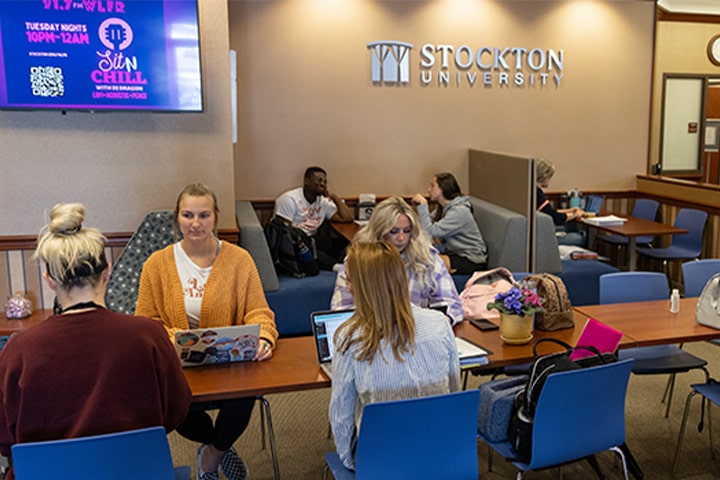
“Having Stockton here as a trusted resource that people knew was huge,” said Lori Pepenella, CEO of the Southern Ocean County Chamber of Commerce.
The chamber’s offices were damaged by the storm, along with many homes and businesses, she said. Internet and other methods of communication were spotty and residents looked for any information they could get about assistance to rebuild.
“We had very few places that we could really work with at the time,” Pepenella said. “Thank God, Stockton was here because if they were only in Galloway, they would have been out of range for us.”
And through those difficult months after the storm, Stockton created a bond with southern Ocean County residents that is still growing today.
“We have provided a much-needed presence in the area,” Collins-Davies said. “We have offered a lot of community engagement. We have done really well at offering programs and inviting the community in to learn.”
Many of those programs are through the Stockton Center for Successful Aging (SCOSA) and the Stockton Institute for Lifelong Learning (SILL). Over the last 10 years, SCOSA has offered courses appealing to the area’s significant senior citizen population, including Chair Yoga, Knitting and Crocheting and Adult Tap Dancing. SILL has offered four-week classes on the history of baseball and the Civil War.
Manahawkin has also offered several undergraduate and graduate classes, Collins-Davies said. Early on, the location hosted science, business and communication disorders classes, and in the 2022-23 academic year it’s offering Introduction to Health Sciences and science classes, such as Animal Behavior and Science of Forecasting Waves.
The biggest undergraduate program with its home at the Manahawkin location is Stockton’s Accelerated Bachelor of Science in Nursing program, where in 15 months students who already have a bachelor’s degree can get an additional bachelor’s degree in nursing.
Center for Community Engagement Celebrates 10th Year
Bryan Gonzalez-Mejia is proof that Stockton University’s Center for Community Engagement and Service-Learning has had a positive impact on students since its inception 10 years ago.
While attending Stockton, the 2019 graduate taught history and civics to recent immigrants in naturalization classes sponsored by the center. Some of his students went on to take and pass the test to become United States citizens.
“It was very rewarding to see that you made a difference in somebody’s life and you were actually part of their journey here,” said Gonzalez-Mejia, who earned a bachelor’s degree in Political Science. “You helped them improve their lives in some way, and that’s going to affect their whole lives, forever.”
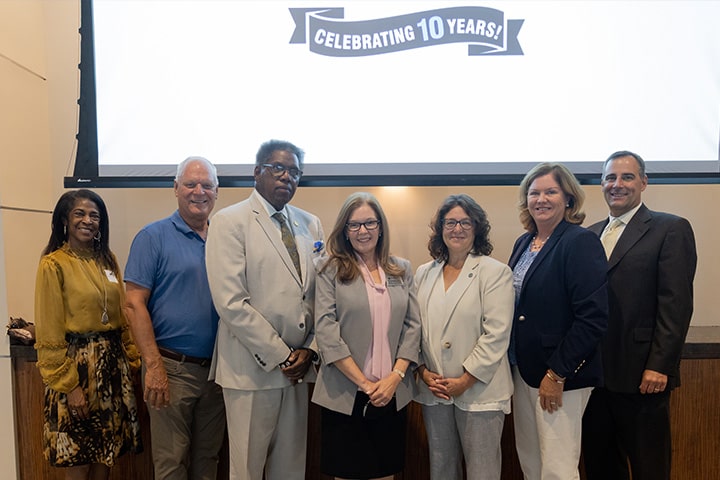
The Glendora resident went on to use what he had learned at Stockton at law school at Rutgers-Camden, where he continued to work and support immigrants’ cases that “probably wouldn’t have happened without my experience here at the center.”
Merydawilda Colón, the center’s executive director, has seen this kind of positive impact on students firsthand. Celebrating its 10th anniversary, the center now has partnerships with approximately 300 groups in South Jersey and has created several community programs, such as naturalization classes and after-school homework programs in Pleasantville and Atlantic City.
“If you really want to expose yourself to something that is a little different, you can’t quite do that in a classroom,” Colón said. “But if you decide that you are going to engage yourself in a community on a regular basis, you are going to work with different people you don’t know – from different ages, from different backgrounds.
Stockton Celebrates 10 Years in Hammonton
It was clear Kramer Hall was more than just a building to everyone attending the 10th anniversary of Stockton University’s Hammonton instructional site April 20.
From the town members who welcomed the revitalization of the former garment building to the students who thrived in the on-site educational programs, about 100 people gathered to celebrate the impact Stockton has had on Hammonton in the last decade.
“Just over 10 years ago, we cut the ribbon on Stockton’s newest location here in Hammonton. The day was cold, but the welcome was warm. Since then, Stockton’s Kramer Hall and the Noyes Museum of Art have been embraced by this town and beyond,” said Christina Birchler, director of the instructional site.
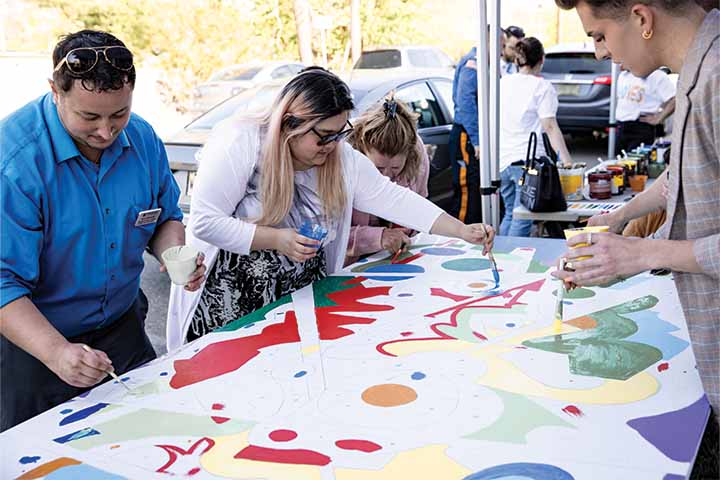
“Kramer Hall has a warmth I never thought a building could have,” said Jennifer Chung of Cherry Hill, who is finishing her master’s degree in Counseling. “Not just from the staff who run it, but the town itself feels like a comforting hug every day when I drive into town.”
Since opening in 2013, Kramer Hall has held over 200 courses with 4,000 enrollments. Currently, the location hosts cohorts of graduate programs in Counseling and Data Science and Strategic Analytics. In the last decade, the site has welcomed over 40,000 guests to more than 1,000 events. Also home to The Noyes Museum of Art, there have been more than 50 exhibits, as well as hundreds of joint efforts with Kramer Hall, offering programming in dance, film and art, said Michael Cagno, executive director of the museum.
Workshop Provides Tools for Teaching the Holocaust
Sheryl Ochayon knows how difficult it is to teach the Holocaust.
“It’s a dark, depressing, complicated subject, which is surrounded by misinformation,” said the director of the Echoes and Reflections project and an educator at the International School for Holocaust Education at Yad Vashem in Israel.
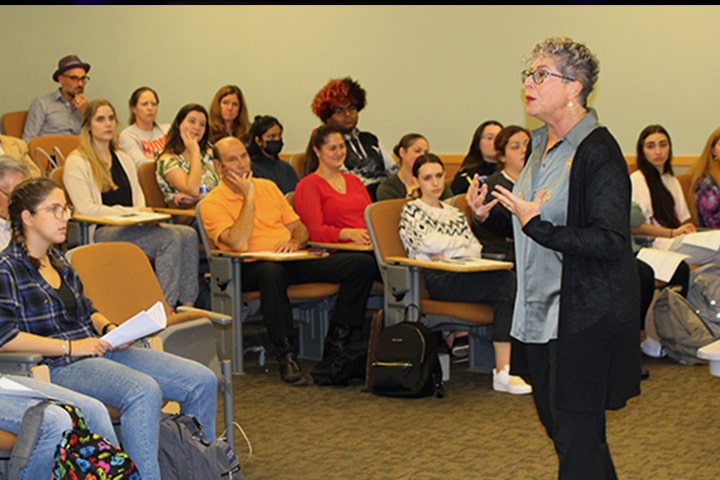
“But if we are going to keep the memory alive, we have to have teachers who know how to do this. How to communicate it to their students and how to use the resources that are available.”
Ochayon hoped to accomplish that during a recent free workshop for educators sponsored by the Sara & Sam Schoffer Holocaust Resource Center at Stockton University. Before a packed lecture hall of at least 75 educators, Ochayon emphasized the impact of Holocaust teaching in middle and high schools and discussed the benefits, and caveats, of using photographs to teach about the historical event.
“The Holocaust is a way to teach and to learn what racism can do, what prejudice can do, what intolerance can do,” she said. “It’s a way to create critical thinking. It’s a way to get people to examine the choices they make because the Holocaust is a laboratory of human behavior under duress. And there’s a lot we can learn from that.”
Ochayon presented the results of a survey showing that students who are taught the history of the Holocaust in high school are more open to different viewpoints, report a greater willingness to challenge intolerant behavior and have a greater sense of social responsibility.
Stockton Professors Produce Original Television Pilot
Shayna Black arrives at her first teaching job at a predominantly white institution in the rural heartland of America, where she is quickly admired for her glowing skin instead of her Ph.D.
She is not taken seriously by her students, who she is just a few years older than. A new colleague tries to set her up with the basketball coach — one of the only other Black people on campus.
Could this really be happening, or is this a work of fiction?
Turns out, it’s both. While Shayna Black is the hip-hop loving millennial protagonist in Professor Donnetrice Allison’s television script, the uncomfortable situations, microaggressions and ignorance were all very real to Allison, who walked in Black’s shoes as a young university professor in the 1990s.
“She is navigating teaching, her love life and the politics of getting tenure,” Allison said.
The “Teaching While Black” pilot was screened last April, in the Fannie Lou Hamer Event Room at Stockton Atlantic City’s John F. Scarpa Academic Center and is open to the public.
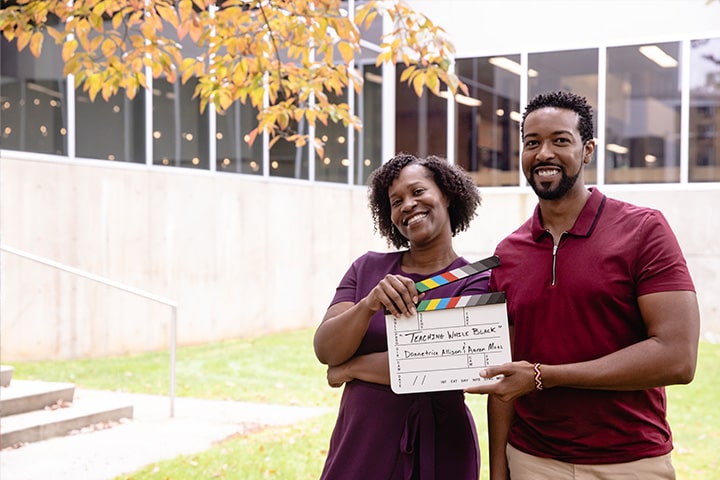
Allison, professor of Communication Studies and Africana Studies at Stockton University, had long wanted to tell this story and thought it had the makings for a TV show. As a critic, she has analyzed how Black people are portrayed in the media for years. She wasn’t sure where to begin, but with the encouragement of family and colleagues, she began writing the early script of “Teaching While Black” in 2018.
“I got some books out from the library and started thinking. I was 25 years old when I started teaching at a PWI (predominately white institution), and the story just came from that,” Allison said.
Since Shayna Black is a millennial, Allison sought out the perspective of Aaron Moss, assistant professor of Theater/Directing at Stockton, about being a young Black faculty member today.
They filmed the pilot over 10 days — sometimes 12-to-16-hour days — in the summer of 2022, largely at Stockton’s Galloway campus. Those familiar with Stockton’s campus will recognize a number of locations, and a few faces.
It was important to both Allison and Moss to involve students in the project, and they reached out to current and former students whose talents aligned with their project. Alumni from Las Vegas to Atlanta and beyond were recruited to work in front of and behind the camera in roles from extras to script supervisor. Amira Lee ’20, served as associate producer and first assistant director. One alum was the scenic designer while another took on a main role.
The pair has written two episodes and has five seasons mapped out in case a producer gets behind the project. They chose to map out five seasons because that is the length of the tenure process. “We had to see the full story they are going through and how much the viewer sees in each episode.”
“Teaching While Black” has been recognized with awards by the Big Apple Film Festival, Filmteenth International Film Festival and the International Black & Diversity Film Festival (IBDFF), in addition to screening all over the United States, including Los Angeles, New York City, D.C. and Houston. The awards from Filmteenth and IBDFF are now on display in the School of Arts & Humanities on the Galloway campus.
Lynn Nottage to Students: Replace Judgment with Curiosity
On the Performing Arts Center mainstage in front of hundreds of students and faculty, Lynn Nottage captivated and surprised them all with her first story about getting forcefully escorted off of the premises of a mega-church after a heated altercation with the pastor.
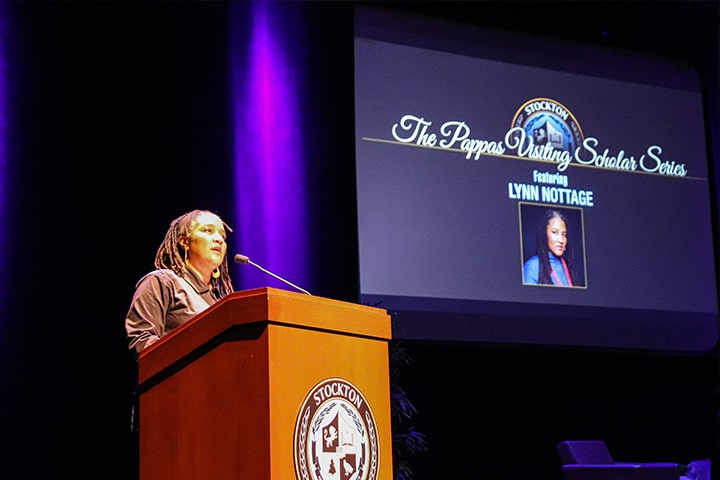
“Rather than using his stage to spread love, foster community and make it a sanctuary of healing, he decided to use God as a wedge, hammer and eraser,” Nottage shared. “I felt compelled to let him know that what he was saying was dangerous. I felt compelled to loudly question his hatred.”
After the exchange, Nottage had a revelation about her complex identity and how that impacts the way she tells stories, which she shared with the audience on Oct. 26, 2022, during the annual Pappas Visiting Scholar Series. This is the first time the series served as a first-year convocation.
“My experience is very complicated, and diverse, and doesn’t always adhere to the traditional paradigms,” Nottage said. “As such, I’m really interested in creating theater that explores the cultural tensions inherent in being a Black woman living in this multicultural society that’s still struggling very much with the painful legacy of racism and sexism. I toy with popular assumptions about race and gender with hopes of arriving at an entirely fresh perspective. Subverting expectations is part of my artistic mission.”
Nottage’s journey to writing the play “Sweat” started with a commission from the Oregon Shakespeare Festival, asking her to write about the American Revolution. She says that it was a challenge that, along with her good friend struggling financially, “awakened her to her own complacency.” This led her to begin asking the hard question: “How and why was my friend in such a crisis in a country as wealthy and powerful as the United States?”
She spent the following two years interviewing the disillusioned people of Reading, Pennsylvania, where the play takes place. Inspired by the stories of factory workers who worked diligently for years, even decades, only to be locked out of their factory and deal with dead-end union negotiations, Nottage faced a perspective different from hers.
“It was then that I decided to replace judgment with curiosity and allowed myself to really listen and hear what they had to say,” Nottage said. “They were not only willing to share their stories with me but to cry in front of me. And, as such, I wanted to write a play that captured the honesty and the contradictions of our conversations as well as reveal ugly truths, and ask these very uncomfortable questions about race, caste and class.”
This birthed not only “Sweat,” but a multimedia performance installation entitled #ThisIsReading as well. The project, which took place in an abandoned railroad station, created a space “filled with music, stories and dance that examined the past and present of Reading.”
Marine Field Station Recommended for $1.4M Grant
The $1 trillion federal Bipartisan Infrastructure Law has funded more than 20,000 projects throughout the country. Now, a piece of the bill is coming to Stockton University to clean local waterways.
The National Oceanic and Atmospheric Administration (NOAA) announced last April that Stockton is recommended for an award of $1.4 million for marine debris removal. With an additional $300,000 matching grant from Stockton, the grant’s total exceeds $1.7 million.
The award — one of the largest awarded to Stockton’s Marine Field Station — has two major components:
- Expanding a program with local fishing industries to identify and remove lost fishing and aquaculture gear in South Jersey waterways.
- Cataloging abandoned watercraft in New Jersey and removing 15-25 target vessels.
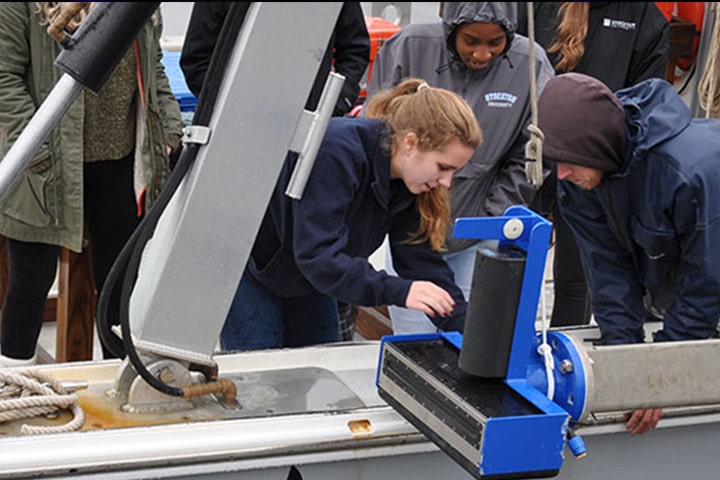
“We have partnered with Stockton University for nearly a decade to remove derelict fishing gear, and value their expertise and commitment to tackling marine debris,” said Katie Morgan, regional coordinator for the NOAA Marine Debris Program in the Mid-Atlantic. “We look forward to continuing this partnership and expanding the impact of Stockton’s efforts in coastal New Jersey to address not only the harmful impacts of derelict fishing gear, but also the dangerous and costly problem of abandoned and derelict vessels.”
This award is the fourth Stockton has received from NOAA as part of the administration’s Marine Debris Program. Stockton received $100,000 in 2012, $119,626 in 2015 and $226,299 in 2018. The money has funded a partnership with local commercial industries to locate derelict crab traps and remove them from New Jersey coastal bays from Mantoloking to Cape May.
Students, Faculty Present at International Conference
Eight Stockton University students presented on their roles as student leaders and community builders in June at the 47th annual Caribbean Studies Association Conference in St. Croix, U.S. Virgin Islands.
According to Shedia Laguer, former assistant director of Student Development and recent graduate of the Ed.D. in Organizational Leadership program, the conference presented an academic opportunity that proved invaluable.
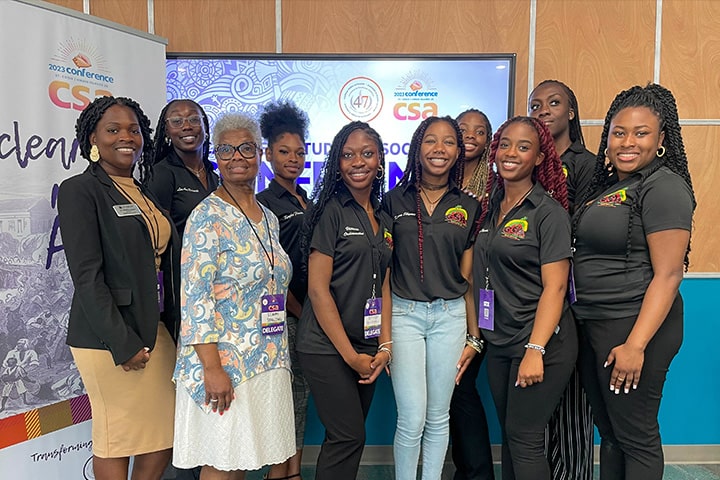
“It is proven that high-impact practices (HIPs) like undergraduate research, study abroad, internships, and service-learning are linked to positive academic outcomes,” Laguer said. “Attending the Caribbean Studies Association conference was a pathway for underrepresented minority students from the Caribbean Student Association (CSA) to engage in these HIPs while learning more about their culture and heritage in the Caribbean.”
In addition to attending sessions and keynotes led by prominent scholars and thinkers of the Caribbean, the students, all a part of the revitalized student group Caribbean Students Association, presented their research on the revitalization of the CSA student group on our campus.
“The president, Ann Delva, and I talked about the process of restarting this club again,” student Lynnsey Raphael said. “We also discussed the struggles of restarting a club as well as what we did within a year. We talked about the different events that we hosted, and the future events we want to hold. Along with my e-board, we had two of our members, Kiana Skyers and Kayla Flowers, come and give testimonies about how CSA impacted their experience at Stockton.”
Skyers felt that presenting in front of an international audience was different from giving a presentation at home — it felt familiar even though she was in an unfamiliar place.



